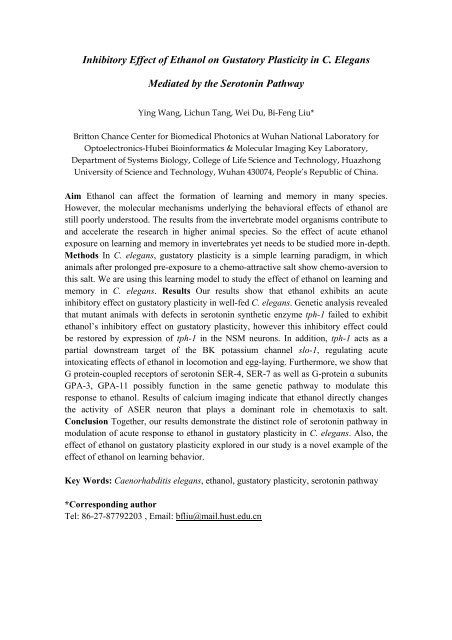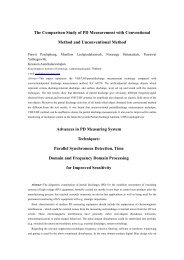New Modes of GPCR Signalling
New Modes of GPCR Signalling
New Modes of GPCR Signalling
Create successful ePaper yourself
Turn your PDF publications into a flip-book with our unique Google optimized e-Paper software.
Inhibitory Effect <strong>of</strong> Ethanol on Gustatory Plasticity in C. Elegans<br />
Mediated by the Serotonin Pathway<br />
Ying Wang, Lichun Tang, Wei Du, Bi-Feng Liu*<br />
Britton Chance Center for Biomedical Photonics at Wuhan National Laboratory for<br />
Optoelectronics-Hubei Bioinformatics & Molecular Imaging Key Laboratory,<br />
Department <strong>of</strong> Systems Biology, College <strong>of</strong> Life Science and Technology, Huazhong<br />
University <strong>of</strong> Science and Technology, Wuhan 430074, People’s Republic <strong>of</strong> China.<br />
Aim Ethanol can affect the formation <strong>of</strong> learning and memory in many species.<br />
However, the molecular mechanisms underlying the behavioral effects <strong>of</strong> ethanol are<br />
still poorly understood. The results from the invertebrate model organisms contribute to<br />
and accelerate the research in higher animal species. So the effect <strong>of</strong> acute ethanol<br />
exposure on learning and memory in invertebrates yet needs to be studied more in-depth.<br />
Methods In C. elegans, gustatory plasticity is a simple learning paradigm, in which<br />
animals after prolonged pre-exposure to a chemo-attractive salt show chemo-aversion to<br />
this salt. We are using this learning model to study the effect <strong>of</strong> ethanol on learning and<br />
memory in C. elegans. Results Our results show that ethanol exhibits an acute<br />
inhibitory effect on gustatory plasticity in well-fed C. elegans. Genetic analysis revealed<br />
that mutant animals with defects in serotonin synthetic enzyme tph-1 failed to exhibit<br />
ethanol’s inhibitory effect on gustatory plasticity, however this inhibitory effect could<br />
be restored by expression <strong>of</strong> tph-1 in the NSM neurons. In addition, tph-1 acts as a<br />
partial downstream target <strong>of</strong> the BK potassium channel slo-1, regulating acute<br />
intoxicating effects <strong>of</strong> ethanol in locomotion and egg-laying. Furthermore, we show that<br />
G protein-coupled receptors <strong>of</strong> serotonin SER-4, SER-7 as well as G-protein α subunits<br />
GPA-3, GPA-11 possibly function in the same genetic pathway to modulate this<br />
response to ethanol. Results <strong>of</strong> calcium imaging indicate that ethanol directly changes<br />
the activity <strong>of</strong> ASER neuron that plays a dominant role in chemotaxis to salt.<br />
Conclusion Together, our results demonstrate the distinct role <strong>of</strong> serotonin pathway in<br />
modulation <strong>of</strong> acute response to ethanol in gustatory plasticity in C. elegans. Also, the<br />
effect <strong>of</strong> ethanol on gustatory plasticity explored in our study is a novel example <strong>of</strong> the<br />
effect <strong>of</strong> ethanol on learning behavior.<br />
Key Words: Caenorhabditis elegans, ethanol, gustatory plasticity, serotonin pathway<br />
*Corresponding author<br />
Tel: 86-27-87792203 , Email: bfliu@mail.hust.edu.cn












